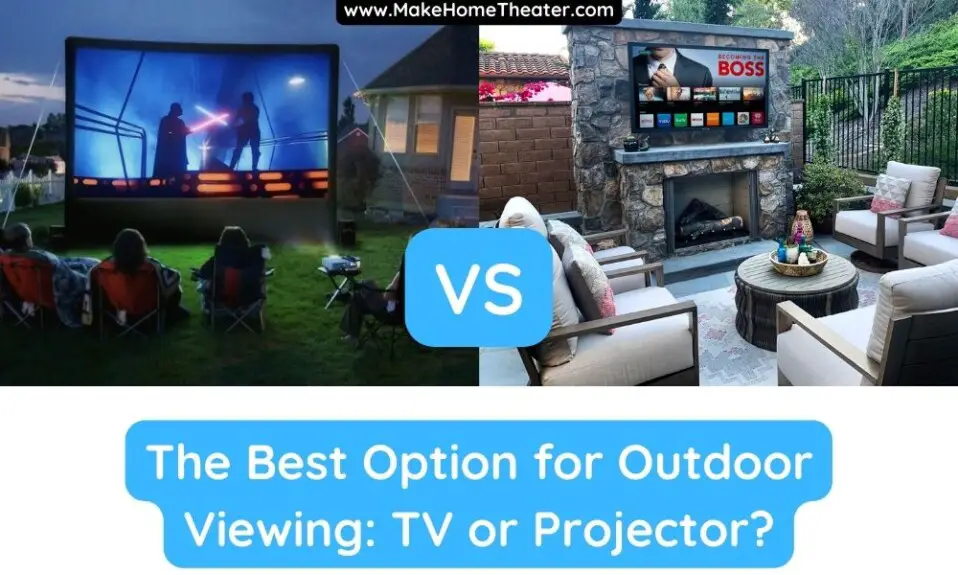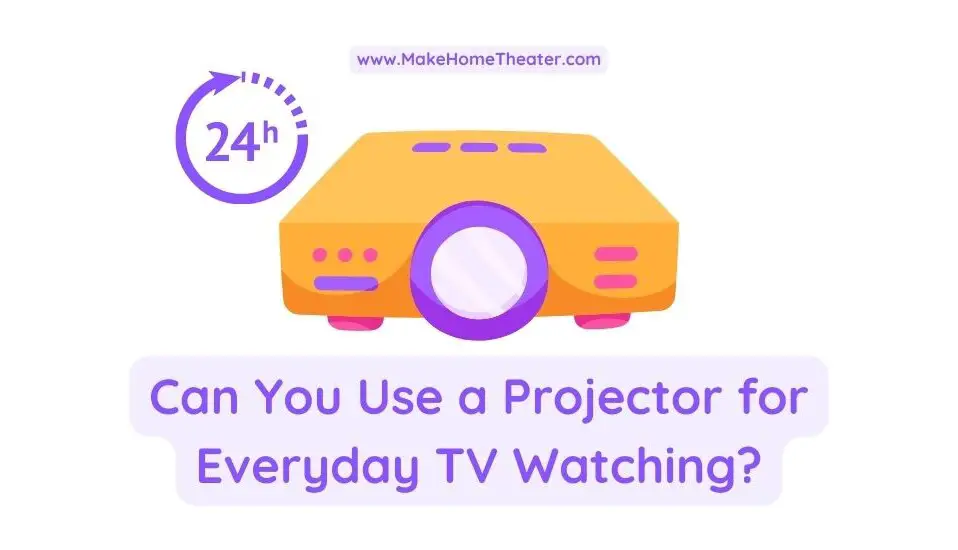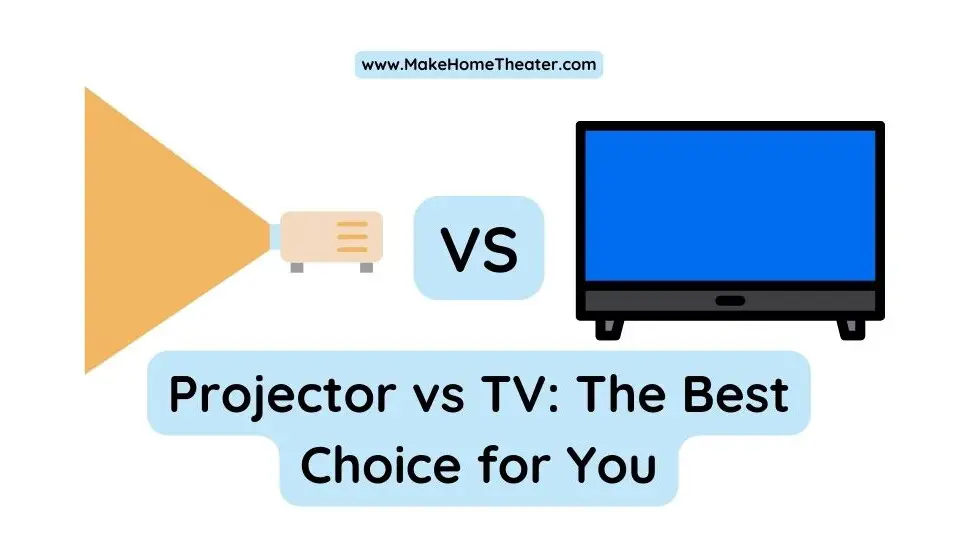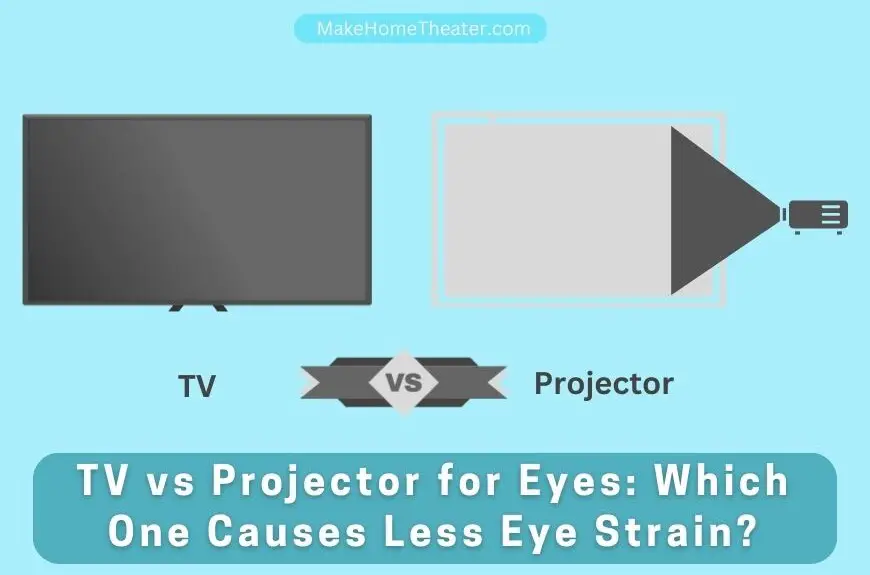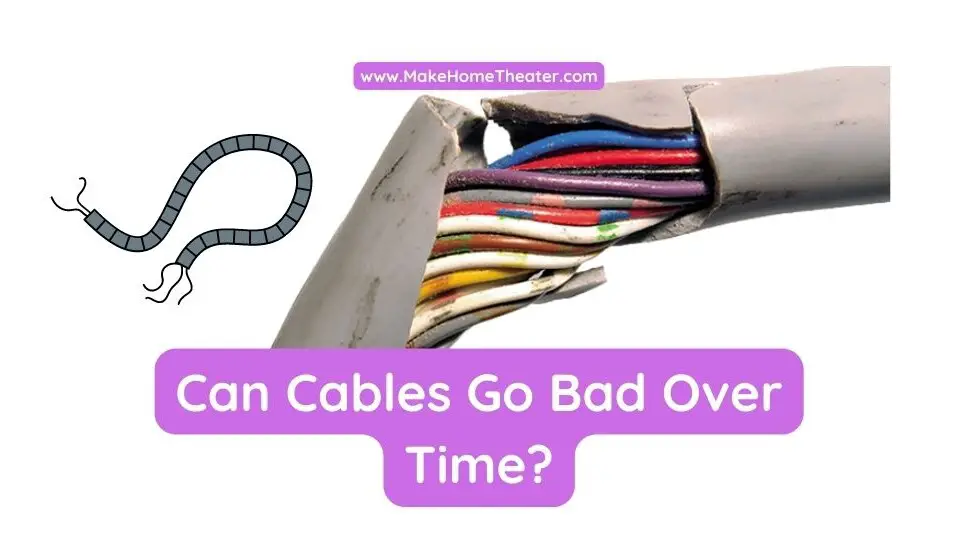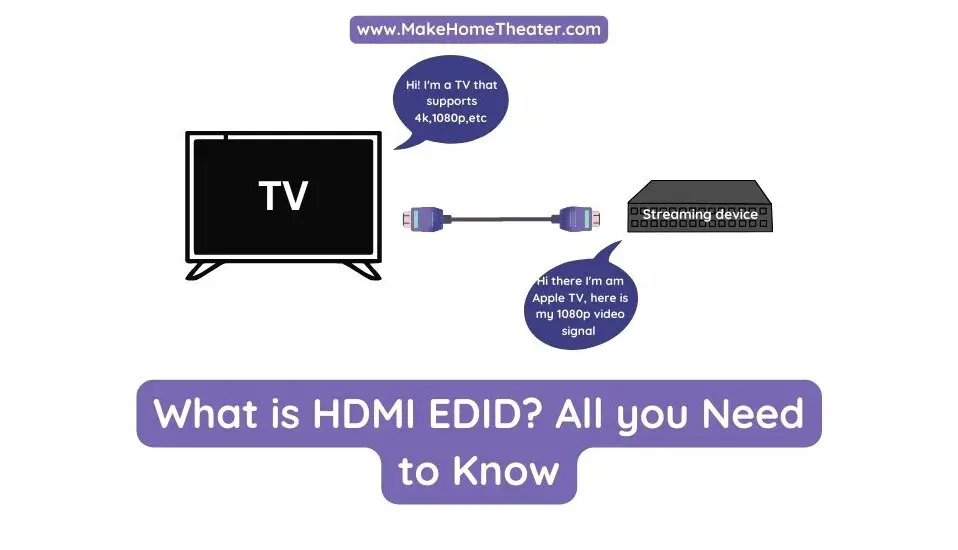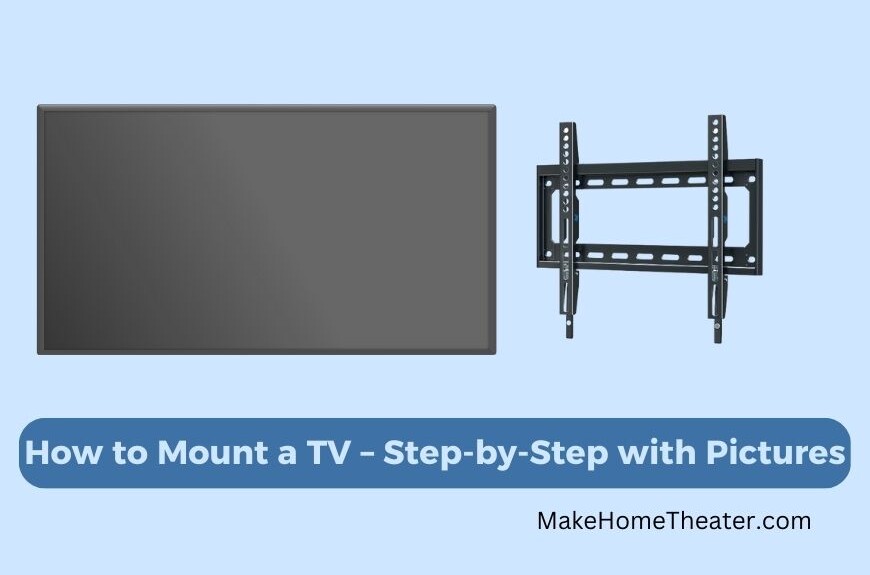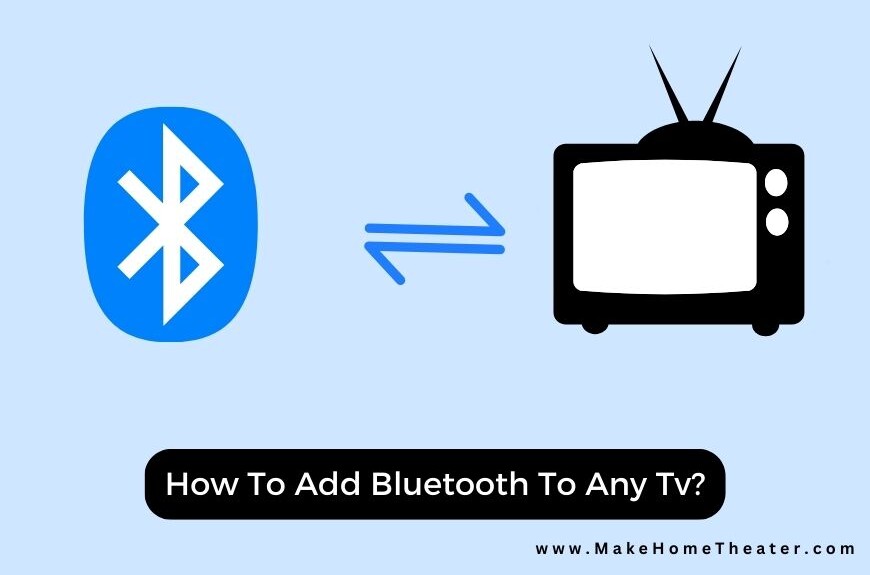If you’re looking to spend some time outdoors, you have a couple of options for setting up your entertainment system. You can choose between an outdoor TV or a projector. Although personal preference plays a significant role, other factors like cost and environment should also be considered.
Outdoor TVs are an excellent option if you require a more permanent solution. However, if you’re entertaining a large crowd, a projector may be a better choice as the screen can be expanded to a much larger size. Both options have their upsides and downsides, and there isn’t a clear-cut winner.
To make the best decision, consider where the electronics will be set up, the cost, installation time, and weatherproofing. It’s also essential to think about how frequently you’ll use your new backyard home theatre. All these factors combined can help you reach a final decision.
If you want to learn more about outdoor TVs and projectors, keep reading.
Table of Contents
Outdoor TVs vs. Outdoor Projectors: Which is Better?
When deciding between an outdoor TV or a projector, there are a few factors to consider. While there is no one-size-fits-all answer, asking yourself some questions can be an excellent starting point. These factors can help guide your decision, which will depend heavily on the viewing environment and your personal needs and wants.
Firstly, consider the environment in which you plan to watch your movies. Are there any obstructions? Is there water, such as a pool, nearby that could affect the electronics? Secondly, take into account the lighting conditions. Will there be a lot of ambient light filtering in? This can play a significant role in how well the device performs.
Another essential factor to consider is whether the outdoor entertainment system will be a permanent addition or just for special occasions. Additionally, think about how much you’re willing to spend. Do you want the best quality, or are you looking for the best value for your money?
Furthermore, consider the additional devices you might need, such as cables, screens, and speakers. How willing are you to purchase these accessories? Lastly, think about the number of people you’re entertaining. The more people, the larger the screen will need to be.
Pros & Cons of Outdoor TVs
If you’re considering purchasing an outdoor TV, there are several important advantages and disadvantages to consider. These are some of the key factors to keep in mind when making your decision:
Advantages of an Outdoor TV
Outdoor TVs may not be as prevalent as one might assume. However, while the options may be limited, there are notable advantages to selecting an outdoor TV over a projector. Here are a few:
Firstly, lighting can be a problem with projectors as they reflect light from a screen to the viewer’s eyes. In contrast, outdoor TVs have their own background lighting, and are less susceptible to glare, making them an ideal choice for outdoor viewing.
Secondly, opting for an outdoor TV provides you with options from several manufacturers that offer reliable products.
Thirdly, outdoor TVs are specifically designed to withstand harsh weather conditions such as rain, heat, and cold weather.
Fourthly, outdoor TVs are easy to set up and do not require additional accessories to operate. All that’s needed is the TV and a source.
Lastly, TVs tend to have better viewing angles, making it easier for everyone to enjoy the content.
It’s essential to keep in mind that not all outdoor TVs are created equal, and it’s advisable to go for trusted brands like Samsung’s Terrace Outdoor TV (on Amazon). While cheaper options may seem appealing, they might not deliver the same level of “weatherproof” protection as reputable brands.
Disadvantages of an Outdoor TV
Despite being durable, outdoor TVs do have some drawbacks. Fortunately, there’s another option worth considering: using a regular TV that can be brought indoors when not in use. This method allows you to save money while still enjoying outdoor viewing. Let’s take a look at the disadvantages of outdoor TVs:
Firstly, the screen size of outdoor TVs, while capable of being large, doesn’t quite match up to the screen real estate that a projector can provide.
Secondly, if you plan to rely on the built-in speakers, the sound quality may be subpar.
Thirdly, when it comes to large groups, outdoor TVs may not be the best option. The more people you have, the fewer opportunities they’ll have to find a good spot to view the screen.
Lastly, outdoor TVs can be very expensive, even when compared to projector setups, making them a significant investment.
By weighing the advantages and disadvantages, you can determine which option works best for your outdoor entertainment needs.
How to Identify the Key Features of an Outdoor TV?
When searching for the best outdoor TV, it’s essential to choose a reputable brand. The SunBrite Outdoor TV, available on Amazon, is a popular choice with great reviews. However, it’s worth noting that the lack of universal industry terms can cause confusion. While terms like “waterproof” may sound promising, they often hold little weight when it comes to electronics.
For this reason, it’s crucial to opt for brands that advertise their products as weatherproof and have an industry-regulated IP rating. A high-quality outdoor TV will be built to withstand not only water but also extreme temperatures to ensure it can handle the outdoor environment.
It’s important to keep in mind the harsh reality of outdoor use. If you choose to leave your TV outside all the time, it will have to endure the elements, including heat and cold. Therefore, investing in a weatherproof outdoor TV is crucial to ensure it lasts in the long run.
Pros & Cons of Outdoor Projectors
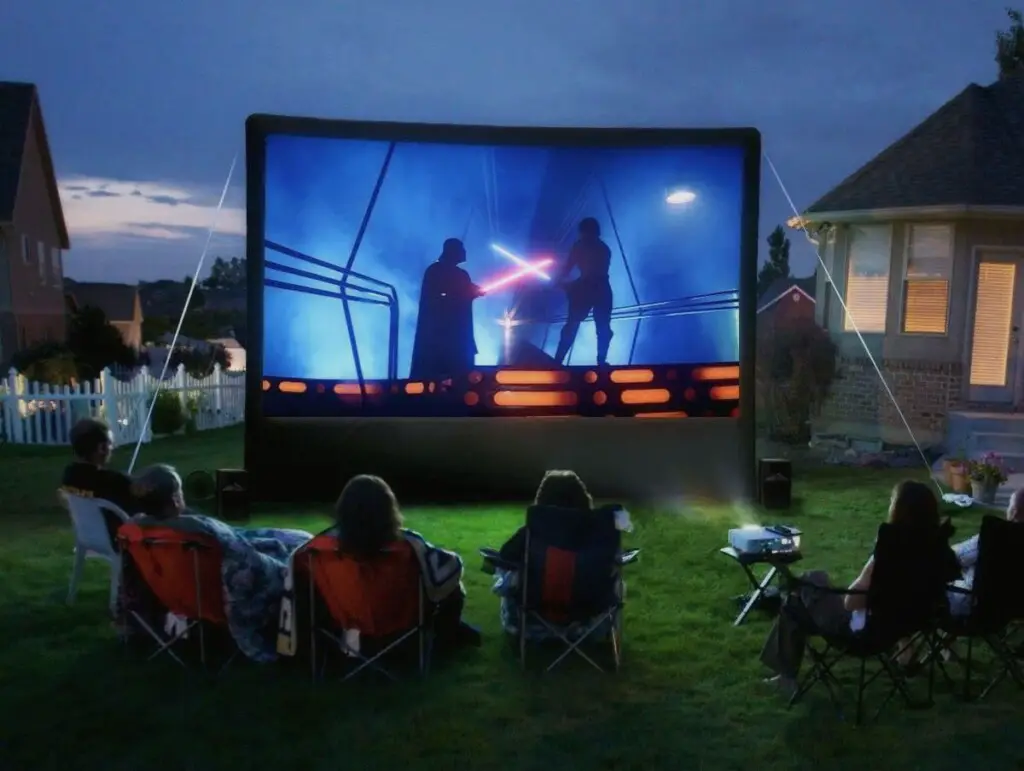
If you’re considering purchasing a projector for outdoor use, there are several factors you should be aware of before making a purchase. Here are some things to keep in mind when deciding if a projector is the right choice for you:
Advantages of Outdoor Projectors
Outdoor viewing can be greatly enhanced with the use of projectors for several reasons. For one, projectors offer superior image quality and a larger screen size, making them a more cost-effective choice than outdoor TVs. Additionally, projectors are easier to set up and can accommodate more viewers.
When it comes to image quality (our guide), projectors excel by providing high-quality images at a fraction of the cost of outdoor TVs. In fact, they can even offer better resolution than an outdoor TV. Furthermore, adjusting the screen size of a projector is easy, making it an ideal option for those with temporary setups. You can also improve the quality of the projected image with some simple adjustments, and we have a guide on how to do that.
In addition to superior image quality, projectors have the advantage of accommodating a larger audience. When entertaining a sizable group, having a large screen size is essential to ensure everyone can see the content being displayed. Projectors can provide just that, making them a great option for outdoor viewing.
What’s more, projectors are more affordable than outdoor TVs, making them a cost-effective choice for those on a budget. Finally, once you’ve become familiar with setting up a projector, it becomes quite easy to do. Setting up a projector for outdoor use should be a breeze after a few tries.
Disadvantages of Projectors
Before deciding whether a projector is the best option for outdoor viewing, it is important to consider the downsides. One of the most significant challenges is lighting. As projectors reflect light off the screen, any ambient light can negatively impact the image quality. The more ambient light there is, the less clear and bright the colors will be, which can affect the viewing experience.
In addition to lighting, weather can also pose a problem for projectors. Rain and wind can distort and misshape the image before it even reaches the screen, which can be frustrating and disappointing for viewers. Unfortunately, weatherproof projectors do not exist, so any outdoor projector setup must be temporary.
What is the required number of Lux/Lumens for an outdoor projector?
One of the most important factors to consider before purchasing a projector is the lumen rating. Lumen refers to the measure of how bright the bulb that powers your projector can get. It’s critical to ensure that you have the appropriate lumen rating for your projector before making any purchase as it can greatly impact its performance.
The lumen rating of your projector can affect several aspects of your viewing experience. Firstly, it can determine how large of a screen you can project onto, as well as the quality of the projected image. The contrast of colors can also be affected by the lumen rating, and it can impact the viewing angles you can have.
It is essential to choose a projector with a lumen rating suitable for outdoor use. A projector with an outdoor use rating will typically have sufficient power to project without any issues. For instance, the Dr.J Outdoor Projector (on Amazon) features 7500 lumens and is designed specifically for outdoor use.
What Should You Look For in an Outdoor Projector?
There are several tips to keep in mind that can help you make the right choice. One of the most important factors is to find a projector that fits your budget and the outdoor environment you’ll be using it in. While a larger screen may seem appealing, keep in mind that most projectors aren’t weatherproof, and you’ll need to move it in and out of your home each time you use it.
To ensure that you choose the right projector, consider the following tips:
Firstly, look for projectors that are specifically designed for outdoor use. These projectors are usually more durable and come with weather-resistant features to withstand the elements.
Check to ensure that the projector’s lumen rating is sufficient for your needs. This will ensure that the image projected is bright enough to be visible in outdoor lighting conditions.
Make sure you don’t need too many external accessories to operate the projector. Some projectors require additional cables or adapters to work correctly, so it’s important to make sure you have everything you need before making a purchase.
Choose a projector that can easily link to your existing media players, such as a laptop or DVD player, for seamless playback.
Finally, consider investing in quality speakers for your outdoor projector setup. Projector speakers are often not powerful enough to provide clear audio in an outdoor environment, so it’s best to invest in external speakers for the best viewing experience.
Is a screen necessary for an outdoor projector?
It’s important to understand how screen type can affect your overall viewing experience. The way a projector creates an image is by projecting it first on the screen, which then reflects the light that hits it. As such, screen choice is crucial in determining the success of a projector setup.
For the best results, consider investing in a quality roll-down screen. This will ensure that you’re matching your new projector with the right screen. There are even projector screens built for outdoor use, such as inflatable screens (on Amazon).
If you’re considering using a wall as your projector screen, there are several factors to consider. First, what color is the wall? Colors like white may seem like a good choice, but they often reflect the most light, which can be problematic in some environments. Additionally, even the smallest of cracks and irregularities on the wall can cause image distortions.
If you plan on using an outdoor wall, you may want to consider prepping and painting it with a proper projector screen paint. Although these paints can be expensive, they are your best bet if you want to use an existing wall as your projector screen. For instance, Paint on Screen Projector Paint (on Amazon) is a good choice.
Can you Rent an Outdoor TV or Projector?
Renting outdoor viewing equipment can definitely be a great option for those who want to enjoy a special event or occasion without investing in the equipment themselves. As you mentioned, the price of rental packages will vary depending on the location and time of year. Renting can also be a good choice if you only plan to use the equipment for a limited time and don’t want to deal with the hassle of storing it when not in use.
It’s important to keep in mind that when renting equipment, you should still take care to handle it properly and avoid damaging it. While insurance may cover some costs, you may still be responsible for any damage beyond the coverage limit. Additionally, it’s a good idea to read the rental agreement carefully to understand the terms and conditions of the rental, including any fees for late returns or damages.


